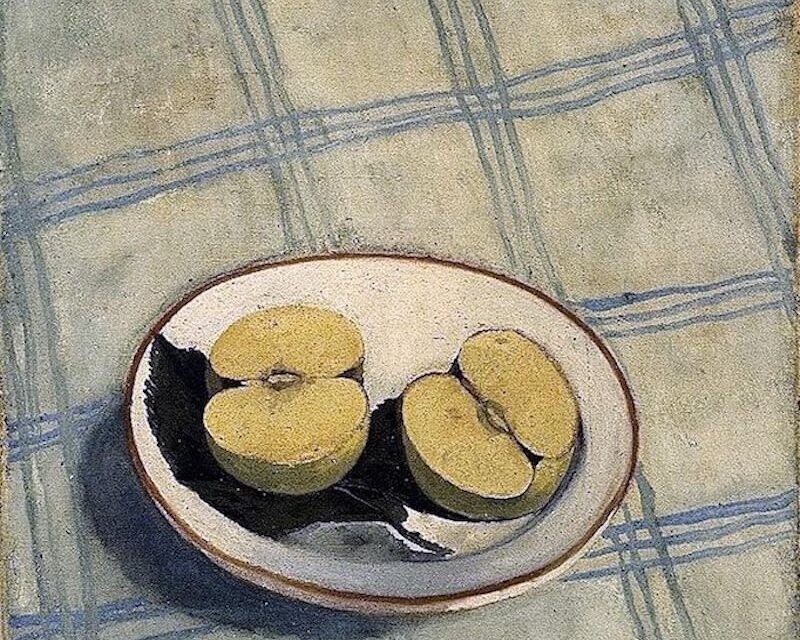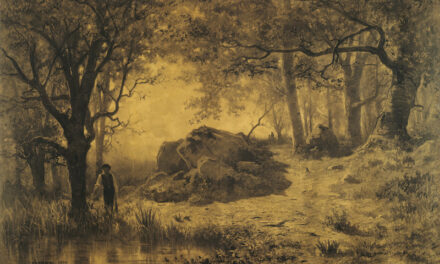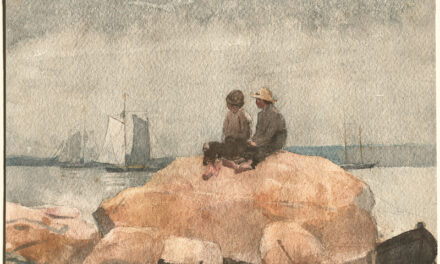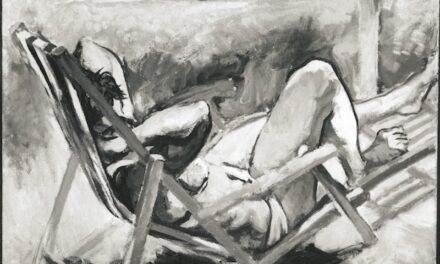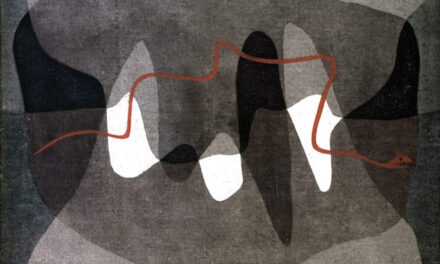Casorati, Felice. Natura morta (mela spaccata). Turin Gallery for Modern and Contemporary Art.
Good Enough To Break Your Mother’s Heart
by Rue Baldry
‘It’s not that sort of test. You can’t fail. You and the optician work together to find out what your eyes are like.’ Mum sticks the parking ticket inside the windscreen.
‘I think maybe I was just tired.’
Mum pulls a big breath in. Holds it. ‘I did say—’ She slams the car door.
‘I know you said that at the time. I’m saying you were right so we should cancel—’
She walks three steps. Karim follows. The car lights up as it locks itself, then settles to wait for them.
‘You couldn’t see the TV clearly. Why not just make sure?’ Mum’s voice is sharp with pretend calm.
Karim knows it will be best if he says nothing more for a while, but he has to make sure: ‘You’ll stay with me the whole time?’
‘I already said I will. I haven’t changed my mind.’
Karim skips forward to grab her hand as she marches across the car park. She lets him, even though he is eleven and so really shouldn’t. He would die of embarrassment if any of his friends saw him holding his mum’s hand. He will be starting secondary school in a few months. That sort of babyishness will definitely have to stop then.
Karim asks again, just in case she wasn’t honest all those times before, in case he might be able to catch her out this time: ‘But does it hurt?’
‘No!’ She sounds irritated, just a little bit, but enough to show that she does remember all the other times he asked. ‘Come on, we’ve got ten minutes to get there.’
He has already reached his top walking speed, and she’ll be cross if he runs. He decides not to annoy her any further by saying that.
What if the optician makes him wear glasses? Karim tries to picture it, but it’s hard enough to summon an image of himself as he looks to other people, without then adding spectacles like Sharpied graffiti round his eyes. He looks down a side road as they cross it, above the shoppers’ heads. He can read Body Shop and Hawkins’ Bazaar, but not the little writing under that. Perhaps everyone else here can see those words. It is impossible to know what other people see. He might be going blind and have no idea.
Life should come with a Pokedex or inventory. There is nothing you can check to find out if you are doing it wrong.
‘Mum, when we get home can I play Minecraft?’
‘You know the answer to that. You’ve had all your screen time for today.’
‘I wasn’t really watching Sponge Bob. I was just in the room when it was on!’ Galisha was the one watching it. Now she’s gone to her friend’s house, where she is probably watching more television unmonitored, where she is sure to be having more fun than he is at the stupid eye test, and he’s the one who’ll have to go a whole day without Minecraft.
‘Minecraft tomorrow,’ Mum says. ‘Here we are.’
The front wall of the opticians is three huge plates of glass. Through them he can see walls lined with glasses frames and mirrors. Everything is white, glass or chrome. Pale spring sunshine bounces around in there before landing on his eyeballs and aching them. Mum lets his hand drop as they cross the threshold.
They wait on white plastic chairs moulded to fit adult backsides. He perches so that his feet nearly reach the floor. There’s a display of little kids’ glasses there, all in pale pinks and blues, with tiny cartoon characters printed down the arms. They won’t make him wear those, will they? He will refuse to go to school if that’s what he gets given.
Next to them is a huge poster of a white man with groomed, pale stubble, wearing sunglasses and gazing off over Karim’s shoulder. His head is bigger than the whole of Karim. You can see each hair and little dots round his nose.
A young Chinese-looking woman, wearing white and a name badge, tells Karim to come with her. She smells like flowers, like Auntie Akeelah’s sitting room, but Karim is still wary of her. He looks at Mum, who’d promised to be with him. He watches her staying put on that plastic chair, until the woman in white shuts the door, closing him into a dark room with her.
Karim is ordered to put his chin on the cold machine and answers the woman’s strange questions about lights and colours until he is allowed to blink his way back out to Mum, tilting his head to see her round the green and red blobs.
A man is bending over her with his huge hand thrust out. She holds it for the briefest moment.
‘Is it ok if I come in with him?’ Mum asks, so Karim realises that this must be the optician.
He is wide and flat, his skin all blotchy reds, purples and pinks. His shirt is grey, with creases Mum would never allow Karim to get away. All the store’s shininess makes him look extra crumpled.
Karim follows Mum following the optician into another tiny room.
‘Mum can sit there. Car-rim, is it?’ The optician looks straight at Karim. Karim nods, even though he pronounced it wrong. ‘And what age are you?’ He doesn’t wait for Karim to reply, starts guessing instead: ‘Ten, nine?’
‘Eleven,’ Karim says.
‘Eleven,’ says the optician. ‘Ah. What a fantastic age to be.’ He sounds sad about it. ‘Good. Can you hop up onto this chair for me, please?’
It looks like the dentist’s chair, but more upright. Karim pulls himself up onto it on his belly, then turns round. It’s quite comfortable, but squeaky. There is a small, frameless mirror on the wall opposite. Karim can’t see himself in it.
The optician’s square back is towards Karim now. There is a tinkling of unseen instruments. Karim remembers the dentist’s scrapers and tiny mirrors on long handles. He looks at Mum, who smiles and nods back.
‘So much potential when you’re eleven,’ the optician says. ‘Especially for a polite, capable boy like you. So many options.’
Karim’s not sure whether he should answer that, doesn’t know what the right answer would be if he did, looks over to Mum again for a clue, but suddenly it is pitch dark.
Karim holds his hands together in his lap, trying not to think about zombies. He startles when the wheels of the optician’s chair whirl.
A switch clicks. Black letters appear in a white square where the mirror was. They leak enough light for Karim to see Mum’s outline, but not her face anymore. He restarts his breathing, but he’s still nervous like spelling tests.
‘What’s the smallest line of letters you can read for me there, Car-rim?’ asks the optician.
‘The bottom line.’
‘Go on, then.’
It’s like that time in numeracy when Mrs. Giffen asked if he’d learned his seven times table and he nodded. She’d waited, he’d stared at her, and eventually, sounding irritated, she had to say, ‘Go on, then,’ just like the optician.
‘H, E, L …’ Karim wants to say ‘P’, even though it’s not the next letter. Instead, after a very small pause, he reads out the rest of the line.
‘Good,’ says the optician.
Karim relaxes a little. This isn’t too difficult after all. His eyes have adjusted enough to see Mum’s smile.
‘Your eyesight’s good enough to break your mother’s heart,’ the optician says.
Karim tenses back up, looking at Mum while the optician fiddles with some glinting flat circles in a tray. She looks as confused as he is.
Karim has felt wary and puzzled before, left grasping for meanings in obscure behaviour, not sure why he’s scared. Sometimes Dad will comment after those times, There are always white people who’ll say things. Mum usually replies, No, I’m sure it wasn’t that, except for that once when she said, Yeah, even I can’t see how it’s anything else.
This doesn’t seem to be anything like those times, though.
The letters change. Karim reads them out. What other options are there?
‘Good enough to break your mother’s heart by joining the Marines,’ the optician says. He comes right up close then, smelling like instant coffee and snot, and looking right into Karim’s eye. ‘My son was just like you. Well-behaved, intelligent, healthy.’
The optician backs up, then comes at him again, wielding a small, white light. ‘When this shines into your eye, you might see some veins and things. That’s quite normal. My lovely son went off to join the Royal Marines and they gave me back a trained killer.’
Karim’s vision goes weird and red and lined, first in one eye, then the next. He won’t be able to see to defend himself from the zombies or the trained killer. Mum will have to save him.
Into Karim’s blindness and the sound of metal instruments, the optician then says, ‘You know, there are a lot of people in society who aren’t as nice as they might be.’ He puts something heavy on Karim’s face, round both ears and over his nose.
Karim wants to leap off the chair and run away, but he also wants to stay right there forever, because he’s scared of what might be in the corridor. At least he can see again now.
‘And I often think, you know, if they could work out how to reverse that Royal Marine training programme, you could turn them into good people. Can you still read that bottom line?’
Karim nods. The metal on his nose moves with his face. He holds the rest of his muscles very still indeed.
Mum laughs then, but not her real laugh. She says, ‘I don’t think Karim’s got any plans to join the armed forces.’ Which is true. ‘Too much running around,’ she says in the voice she uses when she is trying to be funny for strangers. Like in shops and at parents’ evenings.
‘And being shot at. And having to kill people,’ the optician adds, very close to one of Karim’s ears. ‘Look at the little circles on the screen, please. The red one and the green one. Does one of them look clearer to you? The red or the green?’
Karim can’t work out which would be the right answer. After a pause of silent panic, in which he hopes hard that the optician won’t talk about his son again, he says, ‘I don’t know.’
Unexpectedly, the optician smiles.
Something squeaks near Karim’s eyebrow. There is too much darkness to be completely sure that it’s not a scope.
‘When he was your age he got all excited about science lessons, you know, and I hoped that would be… Now which is clearer? The red or the green?’
The green circle has gone all fuzzy without Karim noticing. ‘The red one.’
‘Lovely. Didn’t have to be scientific. Just something quiet that let him stay like that, the person who he was then.’
The optician lifts the heavy structure off Karim’s face, then wheels himself off backwards, holding it. It looks like cyborg augmentation. Karim inhales a full breath.
The world snaps into high definition. The light is back on. Too bright. Karim blinks rapidly while he checks the room’s empty white corners.
‘Perfect eyesight, I’m afraid. You’d pass any medical with those eyes.’ The optician goes to a computer keyboard. ‘All I need to do now is give your mum a certificate of perfection to put on the fridge.’ He types slowly, looking down at his fingers. ‘And there’s no hope for his kids. His daughter’s just decided she wants to be a naval cadet, and his son’s applied for the tank corps.’
Karim hopes Mum isn’t going to put his eye test results on the fridge. It’s not usually the kind of thing she does, but he doesn’t trust his own powers of prediction anymore. He raises his hand to rub at his face. But then he stops, worried what the optician might tell him if he shows weakness like that.
Mum takes hold of Karim’s hands. He doesn’t need any help getting off the chair, but he lets her guide him down. Then she opens the door. Karim checks the white corridor for trained killers, though he’s already worked out that there probably won’t be any. He keeps hold of Mum’s hand. He won’t be letting go of it until they are back at the car. He doesn’t care if any of his friends see.
The optician stays where he is behind them, tapping noisily on the keyboard, so fast now it sounds like rain.
They are nearly out of the building when the woman at the desk calls Mum back to sign some forms. The paper slides against the counter, but neither of them releases her other hand so she can hold it down. Karim waits with his back to the enormous poster of the handsome white man’s face. He itches to be out on the street, walking along the road and round any corner, to a place where it will be safe for Mum to say something like, ‘Well, that was odd.’
What she actually says when they get outside is, ‘Poor man.’
That’s not right. The optician was scary. Mum should pity Karim instead.
They walk slowly back to the car, past Boots, past Ann Summers. Karim watches their reflections walking beside them. The breeze is full of tiny dirt fragments which swirl against his ankles.
Hawkin’s Bazaar, Curiosities, Toys, Gifts, Gadgets and Games. Easy!
Although there are worse things in the world than having to wear glasses.
Mum says, ‘Should have time for an hour of Minecraft before tea.’ That’s when he knows that it is really Karim she feels sorriest for.
He decides he will add a lava moat to his house full of dogs, in the only place in the world where he has complete control.
Rue Baldry lives in Yorkshire, Great Britain. She is a regional winner of the Commonwealth Prize. Her work has also come second in the Yeovil prize, been longlisted for The Women’s Prize Discoveries, and placed in other competitions. Thirty of her stories have appeared in journals such as Granta, The First Line, Fairlight Shorts, Ambit, Litro, MIR, Soliloquies, Mslexia, and Honest Ulsterman. She has a BA in English Literature from York University and a Masters in Creative Writing from Leeds University, was a Jerwood/Arvon mentee and a Bridge Awards Emerging Writer. Her website is https://ruebaldry.wordpress.

